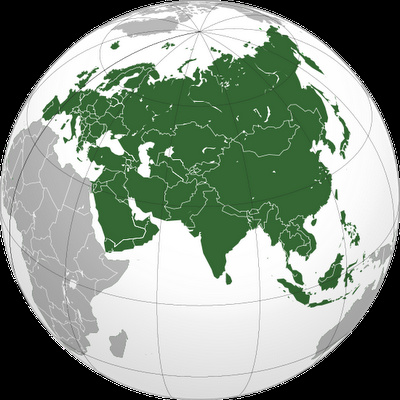What is the US after in Eurasia?

As a concept, a region, and a geopolitical and strategic structure, Eurasia has been the venue for numerous talks and discussions and has vague boundaries which are not clearly defined. It is interesting to note that although the Eurasian reality is very old and ancient, the term Eurasia has been proposed during the past twenty years after the collapse of the Soviet Union. If we look at the categorization of regional deputies at the US State Department, we see that there is a deputy in charge of Eurasian affairs. Therefore, domination over this region is a necessity for US foreign policy. That is why there is a new outlook on China. The Russians have a different look at this phenomenon. The Eurasian way of thinking and the point that Russia is a Eurasian power and not an exclusively western power, has transformed the differences between the West-oriented and Eurasia-oriented individuals in Russia into a classic dialogues and there has been a new look towards the concept of Eurasia and its culture during these past twenty years.
But what should be paid attention to is that this concept is very open and vast and there are different interpretations of it. In Eurasia itself, there are also different regions. This concept, despite all its interpretations and uncertainties, is, and will undoubtedly be, one of the fundamental elements of the international system. There is a mutual relationship between the international system and the interactions that take place in this vast region. With this introduction, in this speech, I will try to look at this region from the viewpoint of the international system; a region whose name contains both Europe and Asia. This speech will attempt to answer questions such as the following: How is it possible to analyze and evaluate relations between Eurasia and the international system after the end of the Cold War? What is the US view, as one of the influential powers of the world, of Eurasia and what role does it play in the transitional phases of the international system? In response to these questions, three concepts will be stressed upon: 1. Eurasia, as a vast geopolitical concept, has always been a forming point of the international system during the past few centuries. 2. Inside Eurasia, after the Cold War, developments are taking place which form the contemporary international system. 3. There are different strategic interpretations for the formation of Eurasia.
Eurasia has had stability in the international system. In the 18th and 19th centuries, a big game was being played between the big powers in a region called Eurasia. In World Wars I and II, the principal scene of disputes was a region named Eurasia. Following World War II and during the Cold War, what was considered as competition between the West and the East was basically competition in this region. Containment of the Soviet Union by the military chain formed by NATO, CENTO, and SEATO, along with tens of other strategic partnerships, demonstrated itself in this region. In fact, it is in this region that the international system has been formed. It can be comprehended from this short review that firstly, the nature of the international system has been related to the state of domination over this vast region. Second, there has been bloody competition for domination over this region which has led to significant world wars, regional wars, and other interventions. The third point is that while this strategic rivalry has been constant and permanent, its forms and manifestations also changed considering the component of changes in power and the big powers in Eurasia.
In the post-Cold War era, the world of international relations has also changed. The changes that are taking place in the international system have elements of the previous system. For example, the US and Europe are still the important western powers, but at the same time, they are faced with changes in the emergence of new players, changes in interactions, the increasing importance of many concepts which were of no importance before, and a variety of different actions. But the important point is that if we accept this analysis, we see that great changes have occurred inside Eurasia which have led to changes in the international system. But what are these changes? The major players here, meaning Russia, India, and regional players like Iran and Turkey, have had different interactions during the past twenty years and have given a new shape to this region.
The other point is that power developments in this region, meaning the emergence of a new China, deep transformation in Russia, and developments related to India and other regional powers, have, hitherto, been formed with no apparent military tension between the forming powers. Right now, the national security strategies of all the big powers have one common concept and that is that the possibility of military tension between the big powers which had formed the previous systems has been reduced.
During the past twenty years, The US has attempted to maintain its power superiority in the world. But how to operationalize this situation has always been an issue of dispute. During the past twenty years, this dispute has led to military conflict, not between the big powers, but through US intervention in this region, such as in Afghanistan and Iraq, and has led to consensus in US strategic circles. In this regard, what is important is to find a Eurasia which not only determines the international situation but also the status of US leadership. Can the US maintain its superiority in this region with friendship and competition, without being engaged in big wars? This is not a simple question. The US has conceptualized in this region. In Obama's conceptualization, he has proposed the transfer of the focal point from western Eurasia to eastern Asia. But the goal behind this conceptualization is domination over the world, because the world is changed from this region.

